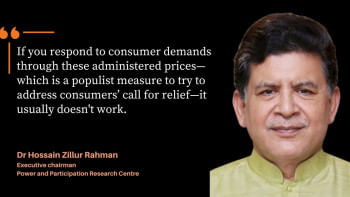Time to enable the Competition Commission to dismantle syndicates

Price fixation of essential commodities has long been an issue in Bangladesh. Although supply is more or less sufficient, consumers continue to suffer from artificially induced shortages and consequent high prices of products. No one can deny the existence of syndicates—groups of businesses manipulating the market—and their role in inflating prices. Although concrete data on price fixing or market syndication is hard to come by, the impact of such activities is quite evident, as reflected in the exorbitant prices of essentials like eggs, onions, rice or potatoes. Besides the agricultural sector, other sectors have also been similarly manipulated by unscrupulous businessmen for undue profits. The question is, who should be responsible for curbing these syndicates? The most logical answer is the Bangladesh Competition Commission (BCC).
Market syndication is not uncommon in the world, and various countries try to combat it through their competition commissions or antitrust agencies using various mechanisms, such as administrative fines, civil enforcement, criminal prosecution, private enforcement, etc. However, the best enforcement mechanism is one that is suited to the context of the country where it is applied. In Bangladesh, the Competition Act, 2012, authorises the BCC to impose significant administrative fines on cartels, defined in the act as "any person or association of persons who, by explicit or implicit agreement, limit or control or attempt to limit or control the production, distribution, sale, price, or transaction of goods or services to establish a monopoly."
The BCC can initiate inquiries into alleged cartels either on its own or based on complaints. However, proving such offences remains challenging due to difficulties in gathering evidence as well as a lack of incentives for whistleblowers or information providers.
Hence, the law should incorporate provisions that can address these challenges and encourage information sharing. One widely adopted approach in this regard is the "leniency mechanism" that offers incentives for cartel members who provide information leading to a successful investigation. More than 60 jurisdictions in the world have been using this mechanism. A leniency programme allows the authorities to accumulate all kinds of information, documents, and communication from one or more cartel members. The evidence collection process is usually cost-effective and reliable. Through this mechanism, any member of a cartel or syndicate can come forward to disclose information to the competition authority, which, if leading to the disruption of the cartel, can earn the informant incentives or full or partial immunity from penalties, as prescribed by a country's law.
For example, we have recently heard of some corporate profiteers creating a market syndicate to control prices of eggs in the country. Allegedly, they control the egg market from the capital by sending a short text or social media message to all wholesalers and traders, informing them about the price they have set for eggs. There is an allegation that they make extra profits by fixing prices under the pretext of supply shortages. So, if an insider comes forward with information that could expose this conspiracy, it could enable the BCC to dismantle the syndicate. In return, the informant could be awarded incentives like full or partial immunity from administrative fines imposed by the BCC. This sort of leniency can be incorporated into the Bangladeshi competition law, and fine reduction guidelines can be adopted based on the standards of international organisations like OECD, ICN, UNCTAD and ASEAN as well as the best practices followed by countries around the world.
Another timely action that the BCC can take is having its investigation teams conduct "dawn raids". The approach would allow BCC to enter any premises unannounced to search for evidence of anti-competitive practices. Many countries around the world are applying this strategy to do unannounced inspections in suspicious places or organisations.
Therefore, we urgently need to amend the Competition Act, 2012, and introduce interventions like the "leniency mechanism" and "dawn raids" to strengthen anti-cartel enforcement and protect consumers from the impacts of price manipulation. The BCC should also ensure enacting guidelines or policies suited to Bangladesh's context. Since it is under the Ministry of Commerce, the latter has to oversee the process of these reforms. Moreover, the BCC should solicit opinions and advice from experts, judges, administrative authorities, and other stakeholders to ensure effective policy creation and advocacy.
Ultimately, we must bolster our competition commission's authority to help dismantle the market syndicates, monopolies, and cartels. Modern anti-cartel enforcement mechanisms are necessary and should be introduced without delay to provide much-need relief for our consumers and ensure fair market practices across the economy.
Shuvadeep Paul is attached officer (senior assistant judge) at the law ministry in Bangladesh and a MEXT (YLP) fellow at the Kyushu University in Japan, specialising in competition law. He can be reached at [email protected].
Views expressed in this article are the authors' own.
Follow The Daily Star Opinion on Facebook for the latest opinions, commentaries and analyses by experts and professionals. To contribute your article or letter to The Daily Star Opinion, see our guidelines for submission.

 For all latest news, follow The Daily Star's Google News channel.
For all latest news, follow The Daily Star's Google News channel. 











Comments